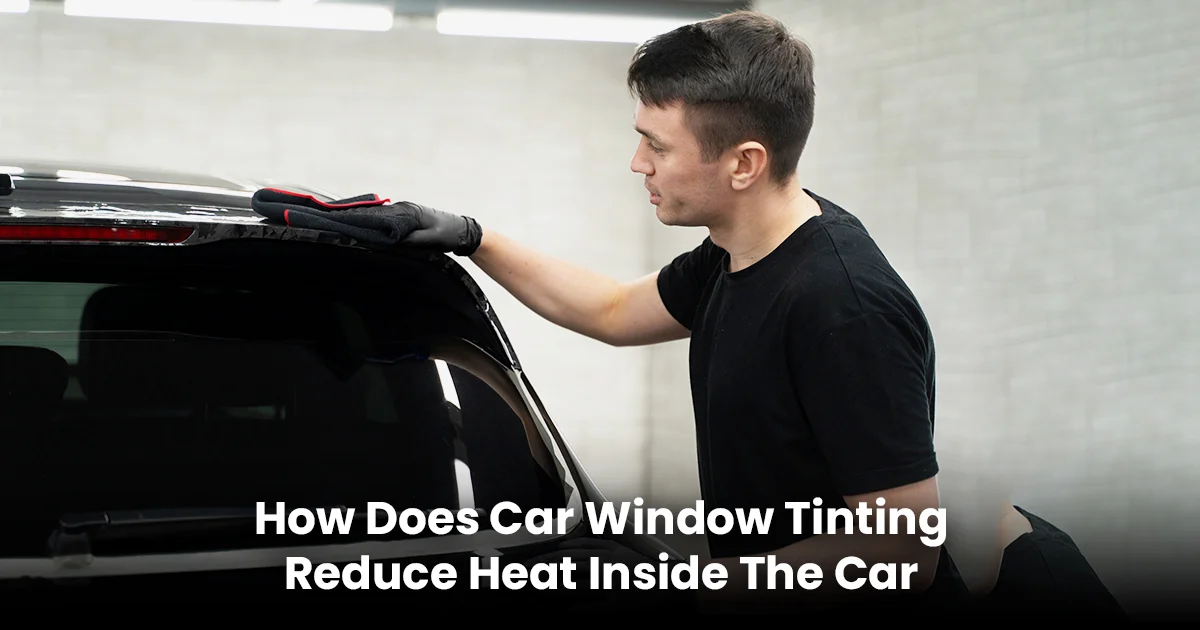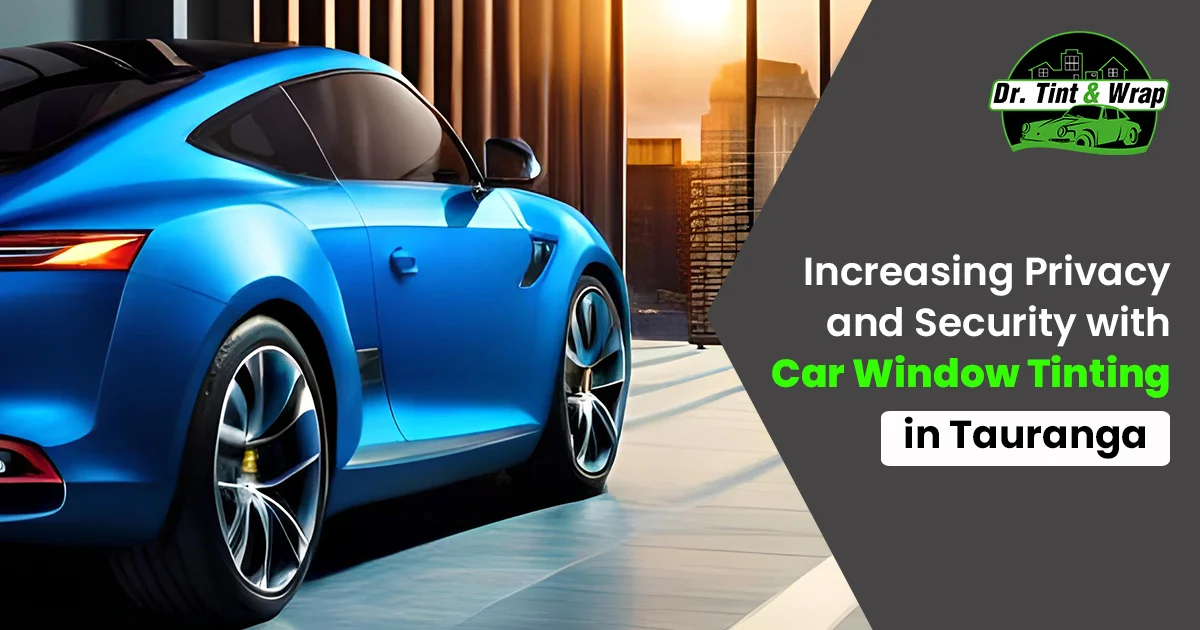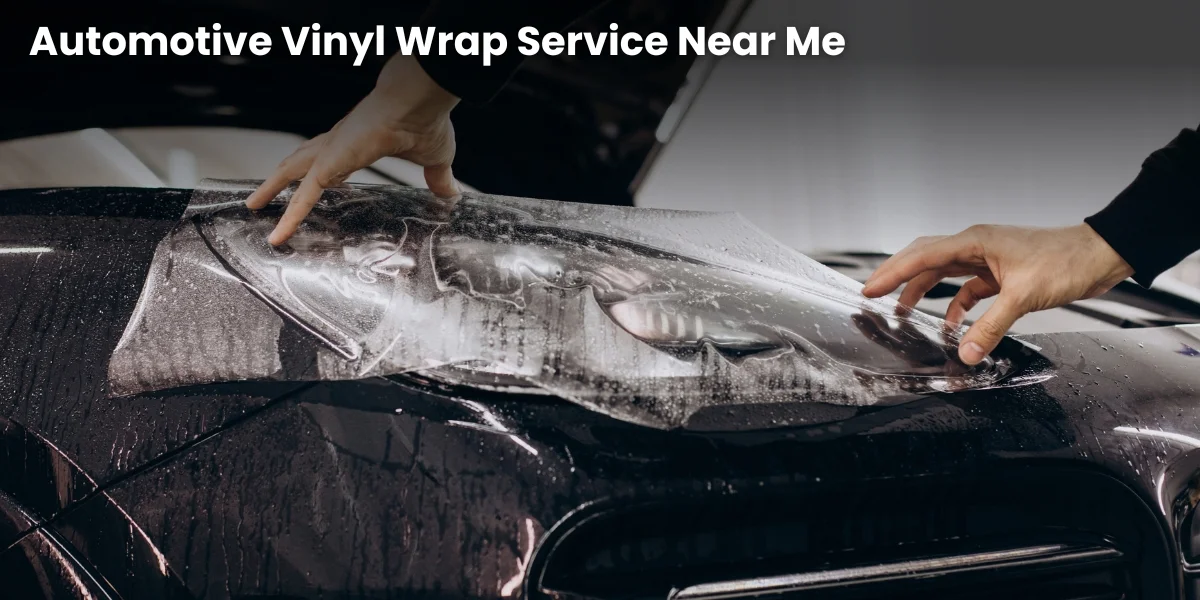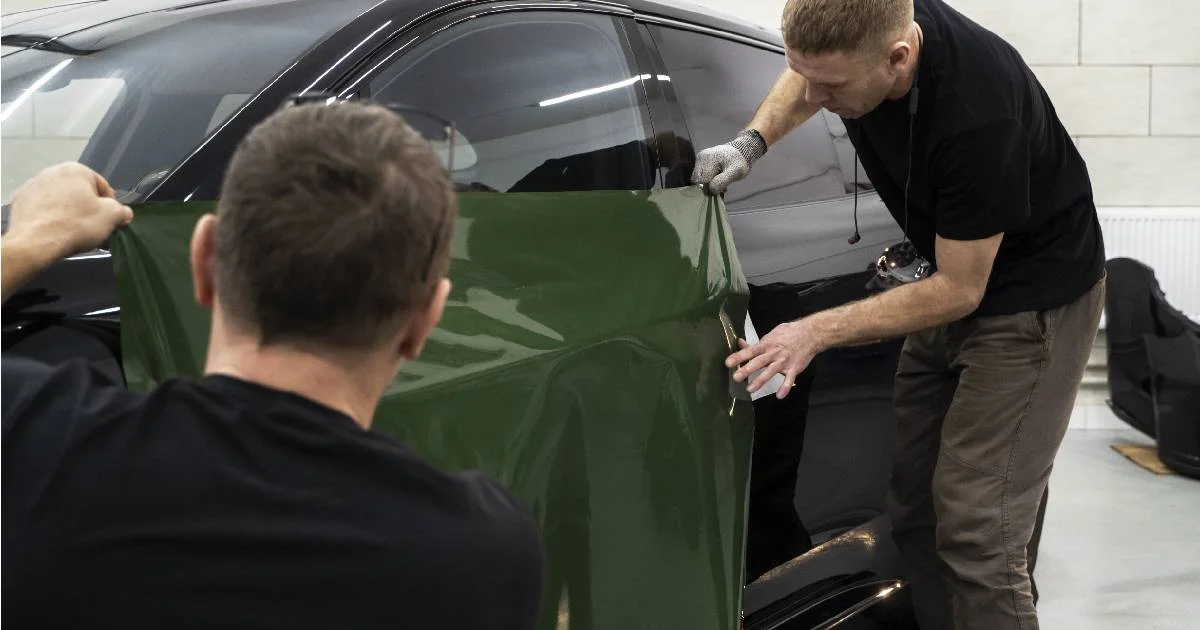
How Does Car Window Tinting Reduce Heat Inside The Car
09 May 2023, By AdminCar window tinting has become increasingly popular among car owners in recent years. This process involves applying a thin, transparent film to the windows of a car, which helps to reduce the amount of heat that enters the vehicle. But how does car window tinting actually work to reduce heat inside the car? In this blog, we'll explore the science behind car window tinting and its effects on reducing heat inside the car.
Tinting films block the sun's rays
Car window tinting works by blocking the sun's rays from entering the car. The film is designed to absorb or reflect the sun's radiation, which is responsible for the heat that builds up inside the vehicle. By reducing the amount of sunlight that enters the car, the tinting film helps to keep the temperature inside the car more comfortable.
Tinting films reduce the amount of visible light that enters the car
In addition to reducing the amount of sunlight that enters the car, car window tinting also reduces the amount of visible light that enters the car. This helps to reduce glare, which can be a major problem for drivers, especially during the day when the sun is bright. By reducing glare, car window tinting makes it easier for drivers to see the road ahead, which can help to prevent accidents.
Tinting films can block up to 99% of UV radiation
Car window tinting films are also designed to block up to 99% of the sun's ultraviolet (UV) radiation. UV radiation can be harmful to both the skin and the interior of a car. Over time, exposure to UV radiation can cause the dashboard and other parts of the car's interior to fade and crack. By blocking UV radiation, car window tinting helps to protect the car's interior and keep it looking new for longer.
Tinting films reduce the need for air conditioning
Because car window tinting helps to reduce the amount of heat that enters the car, it can also help to reduce the need for air conditioning. This not only saves fuel, but it can also help to reduce the wear and tear on the car's air conditioning system, which can extend its lifespan.
In conclusion, car window tinting works by blocking the sun's rays, reducing the amount of visible light that enters the car, blocking up to 99% of UV radiation, and reducing the need for air conditioning. Doing so helps to keep the temperature inside the car more comfortable, protect the car's interior, and improve the safety of drivers on the road. If you're considering getting your car windows tinted, make sure to choose a reputable provider who can help you choose the right type of tinting film for your needs.

Increasing Privacy and Security with Car Window Tinting in Tauranga
09 May 2023, By AdminIn today's fast-paced world, privacy and security are paramount concerns for car owners in Tauranga. As we navigate the bustling streets and parking lots, we often find ourselves seeking ways to enhance the safety of our vehicles and safeguard our personal space. One effective solution that has gained popularity is car window tinting. This article explores how car window tinting in Tauranga can significantly contribute to increasing privacy and security while enhancing the overall driving experience.
1. Privacy on the Road
Car window tinting provides a layer of privacy that allows drivers and passengers to feel more comfortable and secure within their vehicles. By adding a tinted film to the windows, it becomes more challenging for outsiders to see inside the car. This can be particularly beneficial when driving in busy areas, parking lots, or at night, where prying eyes and potential threats are prevalent. With increased privacy, drivers can focus more on the road and their surroundings, reducing distractions and enhancing overall safety.
2. Protection from Harmful UV Rays
Car window tinting not only offers privacy but also serves as a shield against harmful ultraviolet (UV) rays. The tinted film helps block a significant portion of UV rays from penetrating the windows, thereby reducing the risk of sunburns and skin damage caused by prolonged sun exposure. Moreover, it helps to protect the vehicle's interior, such as the dashboard, upholstery, and electronic components, from fading and cracking due to UV ray exposure.
3. Temperature Control and Energy Efficiency
Tauranga's climate can be quite challenging, with scorching summers and chilly winters. Car window tinting can help regulate the interior temperature of your vehicle, keeping it cooler during hot summer days and warmer during cold winters. By reducing the amount of heat entering the car, you can rely less on the air conditioning system, leading to improved fuel efficiency and reduced energy consumption.
4. Shatter Resistance and Safety
In the unfortunate event of an accident or an attempted break-in, window tinting can provide an extra layer of protection. The tinted film helps hold the glass together in case of impact, minimizing the risk of shattered glass flying inside the car. This added safety feature not only protects the occupants from potential injuries but also deters potential thieves who would otherwise be attracted by valuable items visible through the windows.
5. Glare Reduction and Enhanced Driving Experience:
Glare from the sun or bright headlights can significantly impair visibility and cause discomfort while driving. Car window tinting effectively reduces glare, making it easier to see the road and preventing eye strain. By improving visibility and reducing distractions caused by excessive glare, window tinting enhances the overall driving experience and promotes safer driving conditions.
Car window tinting in Tauranga has multiple benefits, ranging from increased privacy and security to protection against harmful UV rays and glare reduction. By investing in professional window tinting services, car owners can create a safer, more comfortable, and enjoyable driving environment for themselves and their passengers. Dr. Tint & Wrap Tauranga is renowned for providing the finest car window tinting services in Tauranga, ensuring impeccable quality and customer satisfaction. With their expertise and attention to detail, they deliver exceptional results that enhance privacy, security, and the overall aesthetic appeal of vehicles.

Automotive Vinyl Wrap Service Near Me
09 May 2023, By AdminTransform your car with Tint a Car – New Zealand’s most trusted name in vinyl wraps and tinting, with over 50 years of experience. We offer professional installations and exclusive products backed by a lifetime nationwide warranty on most films, plus a 30-day money-back guarantee.
What is vinyl car wrapping?
Vinyl car wrapping involves covering your car with high-quality vinyl film, available in a variety of colors, textures, and custom designs. This gives your car a fresh, unique look while also protecting the original paint from damage caused by environmental factors like bird droppings or tree sap.
Why wrap your car?
Wrapping your car is an affordable way to refresh its look while providing a layer of protection. It’s significantly cheaper than a traditional paint job, which can cost anywhere from $1,000 to $10,000. Vinyl wraps start as low as $50 for smaller areas like side mirrors, with larger sections like the bonnet costing around $350. The final price depends on the size of your car and the amount of wrapping needed.
What parts of the car can be wrapped?
From bonnets, roofs, and boots to door handles and racing stripes – we can wrap almost any part of your car. Full wraps are also available for a complete transformation. With a lifespan of 1 to 10 years, vinyl wraps protect your car's original paint from minor chips, weathering, and natural hazards, which can help increase resale value.
Easy to Maintain
Maintaining a vinyl wrap is a breeze—no waxing is required! Just soap and water are enough to keep your car looking clean and sleek. And if you ever want a change, the wrap can be safely removed without affecting the original paint underneath.
Vinyl Wraps for Businesses
Want to promote your business on the go? Vinyl wraps are the perfect solution. Provide us with your design, and we’ll turn your vehicle into a mobile billboard.
Elevate your car’s look and protection with Tint a Car – the experts in vinyl wrapping and tinting in New Zealand.

Vinyl Wrap vs. Paint: Making the Right Choice for Your Vehicle in Rotorua
09 May 2023, By AdminAre you considering a new look for your vehicle in Rotorua? When it comes to transforming the appearance of your car, two popular options stand out: vinyl wrap and traditional paint. Each method has its own set of advantages and considerations, making the decision a crucial one for car enthusiasts. In this post, we'll explore the pros and cons of vinyl wrap versus paint to help you make the right choice for your vehicle in Rotorua.
Vinyl Wrap Rotorua: A Trendy and Protective Option
Advantages of Vinyl Wrap
- Endless Design Possibilities: Vinyl wraps offer a wide range of colors, textures, and finishes, allowing you to unleash your creativity and achieve a unique look for your vehicle.
- Protection for Your Original Paint: Vinyl wraps act as a protective layer for your car's factory paint, shielding it from stone chips, road debris, and minor scratches.
- Removability: One of the significant advantages of vinyl wraps is that they are removable. If you want to change the look of your vehicle or return it to its original state, a vinyl wrap can be taken off without damaging the underlying paint.
- Cost-Effective: In many cases, vinyl wrapping can be a more cost-effective option than a full-paint job, making it an attractive choice for those on a budget.
Considerations for Vinyl Wrap
- Durability: While vinyl wraps provide protection, they may not be as durable as paint when it comes to resisting major impacts or harsh weather conditions.
- Professional Installation: For a flawless finish, it's crucial to have your vinyl wrap installed by a professional. Look for reputable "vehicle wrap near me" services in Rotorua to ensure quality work.
Vehicle Paint in Rotorua: Timeless Elegance with a Few Caveats
Advantages of Vehicle Paint
- Longevity: A well-executed paint job can last for many years, providing a durable and resilient finish.
- High-Quality Finish: Professional painters can achieve a high-quality, glossy finish that is often considered the gold standard in the automotive industry.
Considerations for Vehicle Paint
- Cost: A quality paint job can be more expensive than a vinyl wrap, especially if you opt for custom colors or intricate designs.
- Limited Design Options: While paint offers a classic and elegant look, it may not provide the same variety of design options as vinyl wraps.
- Permanent: Unlike vinyl wraps, paint is a permanent change to your vehicle's appearance. Reverting to the original look may require a significant investment.
Making the Right Choice
Ultimately, the decision between vinyl wrap and paint depends on your preferences, budget, and the desired level of customization. If you're looking for a versatile and cost-effective option with a range of design possibilities, a vinyl wrap in Rotorua might be the ideal choice. On the other hand, if you prioritize longevity and a timeless finish, a professional paint job could be the way to go.
Before making your decision, be sure to research reputable "vehicle wrap near me" services in Rotorua and consult with professionals to determine the best option for your specific vehicle and style preferences. Whether you choose the modern flair of a vinyl wrap or the timeless elegance of a paint job, transforming your vehicle in Rotorua is an exciting journey that reflects your unique taste and style.
